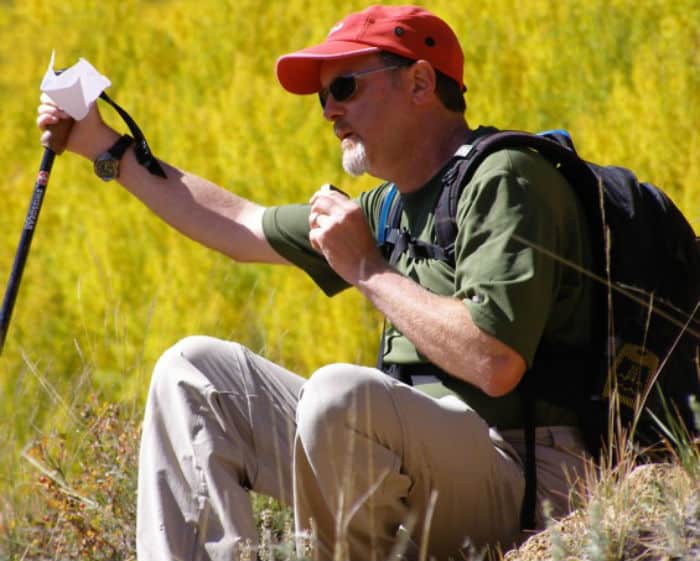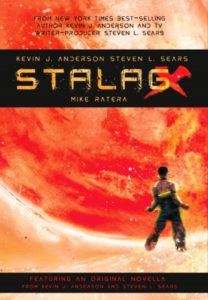If you see a person walking along engaged in a vigorous conversation with no one else around, it doesn’t necessarily mean he’s escaped from the nearest asylum. It could be me talking to myself. But don’t be concerned – I’m writing.
It’s been about fifteen years since I gave up the keyboard and took up a recorder for my first drafts. Since that time, I’ve dictated nearly fifty novels on an innumerable number of microcassettes, speaking the words aloud, rather than typing them on a keyboard.
While this might not seem “unnatural,” remember that the storyteller’s art has always been a spoken one. Revered shamans would tell tales around the campfire, legends of monsters in the darkness or heroes who killed the biggest mammoth. What could be more natural than speaking your novel aloud before committing the words to a computer hard drive or an editor’s red pencil?
Okay, so you’re perfectly satisfied with sitting at your cramped card table after shoving aside the checkbook and the bills to clear a spot for writing. For me, as I write this article, I am hiking in a canyon above the Colorado River, making my way up to a pristine lake and a spectacular waterfall – I wouldn’t trade places in a thousand years.
For your inspiration . . .
One of the primary advantages of writing with a digital recorder is that you can be outside in a spectacular area, bombarded with inspiration. There, the details of nature or history itself can provide story fodder.
Under a tight deadline for one of my Star Wars novels, I went to Sequoia National Park, where I planned to isolate myself and get a lot of writing done. A mountain snowstorm hit. The next day, I trudged out into the new-fallen snow, breaking trail among the pine trees and winding along cross-country ski paths to see frozen waterfalls and beautiful ice shelves on granite outcroppings.
While I walked, smelling the frosty air, seeing my breath in front of me and listening to the wind in the Sierra Nevada mountains, I wrote about Han Solo on the polar icecaps of an alien world. Since I am not able to visit arctic zones on other planets, this was the perfect place to draw inspiration.
Other times I have hiked through the arid canyons of Death Valley, along dried ocean beds and over powdery sand dunes. Feeling the heat and the dry crackling air, I have written many chapters in my best-selling DUNE novels with Brian Herbert.
You can experience sounds and smells and sensations that add vivid details to your prose – details you may not remember while sitting numbed in your cluttered office at home.
For your health . . .
Another advantage of dictating while out walking is the solitude and the peace-of-mind you’ll encounter. You can let your mind sink into the universe of your story, blessedly without interruptions. Out on the trail with your digital recorder, you can avoid telephone calls, faxes, email, the temptation to do the dishes, scrub the toilets, clean the attic. . . .
Let’s face it, writing is a sedentary profession. Authors spend their days seated, fingers on the keyboard, without a great deal of exercise. Personally, I hate being cooped up in the office and would rather be hiking. Once I learned how to dictate, I no longer had to choose between a day of hiking or a day of writing. I can do both at the same time. It keeps me fit and active, and it prevents me from becoming one of those “pear-shaped people.”
On the more serious side, some writers are medically forced to abandon the keyboard and must choose between giving up writing altogether or finding a different method. My wife, best-selling author Rebecca Moesta, suffered from severe carpal tunnel syndrome in both wrists and cubital tunnel nerve entrapment in both elbows, which in the end cost her four surgeries and a draconian reduction of her keyboard time.
Rebecca had always considered my technique of dictating to be somewhat eccentric, but now she found herself forced to get a headset and digital recorder of her own.
For your productivity . . .
When I’m out dictating I manage to produce far more pages in less time than if I’m chained to my desk. I’ve even learned how to fool myself into writing more than I originally intended to do. In a trick I call the “round-trip deception,” I will keep hiking outbound until I have completed one entire chapter . . . at which point I should have just enough time on the way back to dictate another full chapter. Since I have to walk back anyway, I might as well be writing.
During the week I just spent in southern Utah, I hiked a total of fifty miles and wrote 168 pages in my new novel, as well as this article. (Hmmm, that’s about three-and-a-half pages per mile!) It would have been impossible for me to do this much at home with numerous distractions.
And the drawbacks . . .
The most obvious drawback with dictation is that once you’ve recorded a chapter, then it must be transcribed. Depending on how fast you type, you can transcribe your own files, of course – but to me this defeats the purpose of using a recorder. In the time it takes to transcribe a chapter, I could just as well have written a completely new one.
Typists offer their services in the classified ads of many writers’ magazines; transcribers or stenographers are also listed in your local yellow pages. The going rate seems to be around $2–$3 per page.
For your consideration . . .
Always keep in mind that, like any other writing technique, dictation is a skill that must be learned. Give it time and practice. I started out carrying a recorder to dictate occasional notes because I liked to walk while mulling over storylines and developing characters. This habit evolved into speaking outlines, laying out scenes, and then detailed rough drafts. Now it’s graduated to near-finished prose.
First, you’ll need a recorder, available at any office supply store. A typical hand-held recorder should cost fifty dollars or less (probably one of the least expensive pieces of equipment in your office.)
You may become self-conscious when people look at you talking surreptitiously into your digital recorder – but, in the words of the genius Richard Feynman, “What do you care what people think?”
So keep an open mind if you are willing to try a new writing technique. Go out and talk to yourself.
Question or comments about dictating? Let’s chat on Facebook.
Kevin J. Anderson is the author of over 145 books, 56 of which have appeared on national or international bestseller lists. He has won or been nominated for the Bram Stoker, Shamus, Hugo, Nebula, Scribe, and Colorado Book Award. As the publishers of WordFire Press, Kevin and his wife Rebecca Moesta have released more than 300 titles from Alan Dean Foster, Frank Herbert, Jody Lynn Nye, Allen Drury, Mike Resnick, Tracy Hickman, Jay Lake, Brian Herbert, Ken Scholes, and their own backlist.
Kevin climbs mountains. He and his wife have been married for twenty-five years; they live in a castle in the Rocky Mountains of Colorado. Twitter: @theKJA







